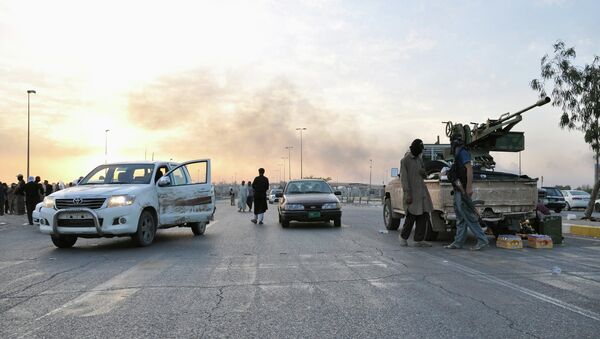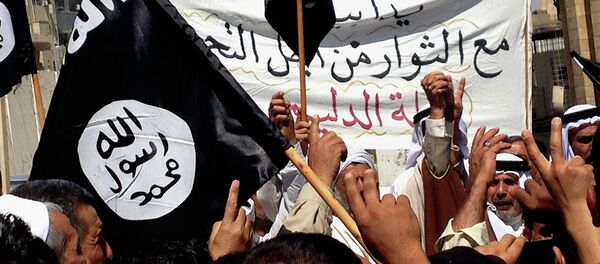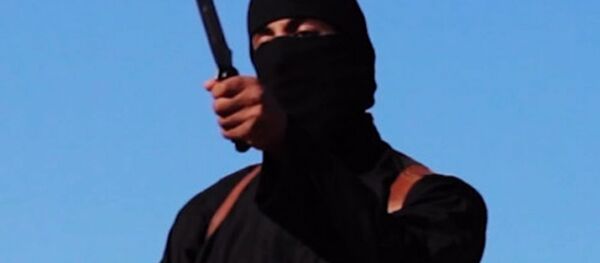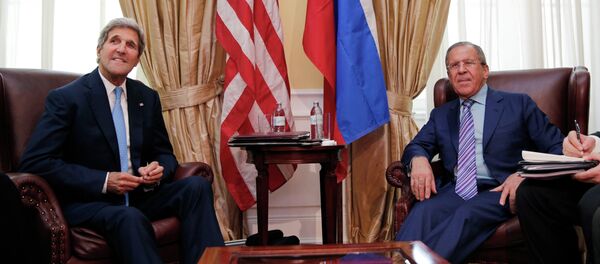The Syrian authorities allowed Sputnik correspondents to speak with captured militants from Kyrgyzstan, obtaining first-hand information about ISIL sources of revenue and life in terrorist-controlled cities.
LIFE AND WORK IN THE 'CALIPHATE'
It might seem strange, but the conversation took place in the interrogation room of a Damascus prison. Mohammed Yahya Hakmedjan, a citizen of Kyrgyzstan, who left his country in 2011 and went to Egypt to study Islam at Al-Azhar Al-Sharif University, was the first to speak.
After dropping out during his second year, Hakemjan was instructed by radical preachers to leave Egypt for Syria via Turkey and to fight a "holy war" in the name of Islam there. Sympathetic Muslims helped the young militant reach Istanbul. Once there, he took a bus to the Turkish-Syrian border where he joined a small group of fellow Islamists. One night, he and his companions illegally crossed the border with the help of local guides.
The militant noted that they immediately started explaining to him that foreigners from the ISIL organization wanted to spread Sharia concepts to Syria, Iraq and all over the world. A community where incoming young people trained to become terrorists had separate homes for Arabs and those for Europeans.
The Kyrgyz national and six other people, including three from Eastern Europe, took their oath on that very day.
When asked about his work in the ISIL, he noted proudly that, after militants from the al-Nusra Front organization entered the city, he was placed in charge of a group of women and children because of his fluent Arabic, and they told him to take the families to Raqqah, a city in northeastern Syria that was seized by the terrorists in October 2014.
Raqqah was later proclaimed the capital of the "Caliphate."
"We boarded comfortable buses in an Aleppo suburb and rode to Raqqah, accompanied by two respected sheikhs and about 20 women with children from Uzbekistan and other countries. After our boys clashed with militants of the ‘Free Army’ and Jaysh al-Islam for control over this territory, ISIL militants had to retreat to Raqqah," he said.
He claimed that he had worked as an interpreter during his four-month stay in Raqqah, and that he was responsible for a financial assistance program. Hakemjan received money from an ISIL leader and purchased food for women and children arriving in the city. He was also instructed to take patients to the central city hospital.
According to the militant, people in the capital of the "Caliphate" receive donations from wealthy "patrons of radical Islam," specifically, from Gulf countries, Egypt and Syria. Apart from direct funding, they sold "trophies" and oil to local residents and to Turkey, the militant added.
"Many people from Turkey came and went unhindered. I saw them carrying weapons with one shipment," he recalled. After pausing for a while, possibly remembering a positive memory, he started talking about relations with his family.
"My father is an atheist who does not believe in Jihad, he has denounced me for what I’ve done and urged me to resume my studies in Egypt. I have called him three times. The last time I called him I was into the third month of my stay in ISIL. After that, they stopped answering and changed their phone number. They are probably afraid that the authorities will learn about me, and that my father will be sent to prison," Hakmedjan noted.
Before returning to his cell, he said quietly that he would go home if he ever managed to leave prison.
We then spoke with another Kyrgyz national who had received some military training and who fought for a while before being arrested. The second man claimed to have been deceived by radical Islamic leaders who recruited him online. These leaders claimed that the Syrian Army was killing the righteous, women and children, which turned out to be complete lies.
ISIL MILITANTS TRAINING ROOKIE
Mohammed Hanouf Azamedjan, who replaced Hakmedjan, noted with pleasure that, unlike his fellow Kyrgyz citizen, he had received military training in an Aleppo suburb and had fought for a while "in the name of Islam."
This extremely young terrorist also studied at Al-Azhar Al-Sharif University and entered Syria through the same route as Hakmedjan.
He spent the first 20 days in the "Caliphate" living at a local "guesthouse" together with "buddies" from Saudi Arabia and Jordan where they ate and drank free of charge.
He said almost all the militants were foreigners, primarily from Saudi Arabia. Experienced militants trained raw recruits to shoot various assault rifles, large-calibre machine guns and mortars. His group also took a tank-driving course. After training for a month, the young militant Azamedjan was sent to the "Arab House" where Arab citizens live, and where he took an oath of allegiance to Abu Bakr Baghdadi, the so-called "Islamic State Caliph."
Two days later, he was sent to the front and ordered to guard a medications factory in Kafr Hamra. Although the factory did not operate during his tour of duty, the warehouses were filled with medical preparations.
Two months later, the ISIL and Jaysh al-Islam fought intensively for control of the factory. After being subjected to numerous attacks, the ISIL militants left their positions and fled toward Aleppo. From there, they went to Raqqah where the young man worked as an orderly at a local hospital and was captured some time later.
When asked whether he wanted to resume peaceful life, Azamedjan replied that there was no jihad in Syria, only carnage. He assured me that he was dreaming of going back to Egypt and resuming his studies there.






